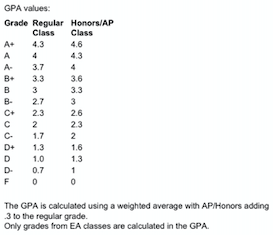Riya Mukherjee ’23 | Alexandra Gobran ’23
Grade bumps for Honors and AP courses are set to be eliminated beginning with the class of 2025 – next year’s freshman class.
Michael Letts, Head of the Upper School, explains, “In essence, everyone who is currently in the upper school has essentially been grandfathered in. We are not going to change the game and recalculate their GPAs, so they will continue to use the weighted system. But, beginning with the rising ninth graders, they will go on a straight 4 to 1 scale and no weighting will be given if it is an honors or AP designation.”

Photo courtesy of student from Class of ’22
The current GPA system uses a four-point scale where earning an A+ in an honors or AP class is worth a 4.6, and your GPA goes 0.3 down for each grade level below. In a regular class, getting an A+ is worth a 4.3 and it decreases 0.3 for each grade level below.
Starting with the rising freshmen, however, there will be no GPA difference between a regular and an honors class. If you earn an A+, regardless of the course rigor, it will be equivalent to a 4.25 GPA, and will decrease by 0.25 for every grade level lower. Mahliat Tamrat ‘23 says, “Honestly, I would prefer the grading system that is currently in place. I like that in case I get a lower grade than expected in an honors class, there’s some reassurance that it won’t hurt my GPA.”
Members from the current 8th-grade class express concern about how colleges will perceive their lower GPAs. Tory Lynn ‘25 says, “I am a little worried that while I am challenging myself by taking higher-level classes, colleges won’t be able to recognize the extra effort I put in.” Letts, however, reassures that this change will have no significant impact on a college’s decision to accept or reject you since they will also account for your course rigor. He explains, “The school you apply to will take your grades, the course, and the rigor, and they will run it through their own calculations and do their own manipulation of those numbers anyway.”
Similarly, Letts notes that course rigor is taken into consideration when selecting for the Cum Laude Society, a renowned honors society that grants admission based on a GPA threshold. Furthermore, he notes that when calculating “the top twenty percent of previous classes and then doing the same thing without the weighting, when it comes to Cum Laude, it’s the same group of kids weighted or not – with the exception of maybe two or three students.”
Letts also emphasizes that a goal of the new GPA system is for students to enroll in classes orientated towards their skill sets and comfort levels. He notes, “Our feeling was that taking out the weighted system would help ensure that students were taking the appropriate level courses for them and not a course simply based on an AP or Honors course that they probably shouldn’t be in. They will hopefully focus more on their interests and their appropriate level.”
This change is meant to inspire students to pursue their passions rather than solely take classes that will earn them a higher grade to boost their GPA. Letts adds, “I worry about some of the non-honors electives that are entry points into other areas [and] discipline[s] that a student might find to be extraordinarily interesting or something that you develop a passion for, but you don’t take it because it’s not an honors level course.” Gray Collins ‘25 speaks on how he thinks that the change could be a positive, saying, “Since it’s an unweighted system, I think I will be more focused on taking classes that suit what I am personally capable of, rather than taking courses just to ‘look good’ to colleges.”
Letts is optimistic about the future of the new GPA system, adding, “Every student is different. What one student may be capable of in certain academic disciplines may differ from what another student may be capable of. And we want you to achieve it at your place, at your level, without trying to compare yourself to the other others around you, who are very different and have different strengths and different talents.”